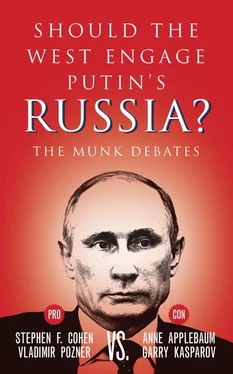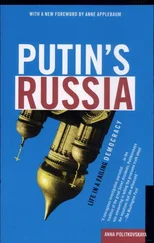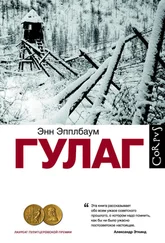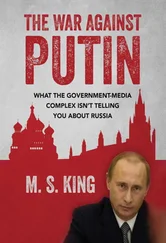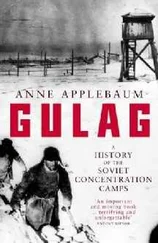Our side of the debate, and certainly not our opponents, have not talked enough about the people who have been the most important victims of the West’s policy of engagement until now: the young, energized Ukrainians who stood on the Maidan last year in the cold in order to fight Putin-style corruption and dictatorship. In the past eighteen months, these men and women have created new television stations from scratch; run for parliament and won on anti-corruption tickets; and have set up organizations designed to promote good government and transparency.
They may well not succeed, since they have extraordinary obstacles to overcome, but their goal is to create a more democratic, fair, and less corrupt world in the twenty-first century, and Putin’s Russia is trying to stop them. I repeat: Ukraine is not Putin’s only target. He also wants to undermine our societies, corrupt our politicians, and spread conspiracies inside our media. He hopes to persuade Europeans to succumb to the old temptations of the fascist far right.
To stop this from happening, and to stop him from destroying Ukraine, we need to isolate Russia by enforcing our own corruption laws, disentangling ourselves from the drug of Russian money, and re-establishing Western solidarity, which he is trying to destroy.
RUDYARD GRIFFITHS: Mr. Pozner, you have the last word.
VLADIMIR POZNER: Thank you. I refuse to play this game of who’s nice and who’s not. I care about Russia so I’m only going to ask you one question: What are the consequences of isolating Russia? Well, on my count, there is a minimum of ten. And all ten are detrimental to the West.
First, it plays into the hands of the chauvinist, anti-Western forces in Russia that dream of bringing down the Iron Curtain again. Second, it plays into the hands of the traditionally anti-Western Russian Orthodox Church. Third, it reinforces the feeling now shared by 73 percent of all Russians that the West, led by the United States, is the enemy. Fourth, it turns Russia eastward into a partnership with communist China, a partnership that is both dangerous and threatening to the West. Fifth, it makes Russia ever more unpredictable. Sixth, it plays into the hands of Russia’s military industrial complex. Seventh, it reinforces the traditional Russian desire to circle the wagons in view of what seems like a hostile environment. Eighth, it minimizes any outside information for the Russian people who presently have access to Western media, movies, and to the Internet. Ninth, it cuts off travel for all average citizens, including for tourism, exchanges, and educational opportunities. And tenth, it leads to the birth of a generation of Russians hostile to the West.
What are the consequences of the West engaging Russia? By engaging Russia, I mean opening its doors to as many Russians as is physically possible, easing visa restrictions or waiving them altogether, allowing Russians to visit, to work, to send their children to schools and universities, to develop human contacts. By doing so, the West will achieve a profound change in people’s mindsets, which will fundamentally change the country’s politics and its policies. It will not happen overnight. But it will inevitably happen. And this beyond a shadow of a doubt will be a huge benefit for the West and, by the same token, for Russia and for the Russian people.
And, finally, I’d like to say that if, as Ms. Applebaum once wrote, the Russian president dreams of setting down a new Iron Curtain, well then isolating Russia is playing right into Mr. Putin’s hands. Thank you very much.
RUDYARD GRIFFITHS: Ladies and gentlemen, we’ve been treated to a superb hour and a half tonight. I want to thank our debaters; on behalf of the entire audience, bravo! And again, thank you to the Aurea Foundation for making this all possible. This is the kind of informed conversation that benefits us all, regardless of what side of this issue you stand on.
Summary: The pre-debate vote was 58 percent in favour of the resolution and 42 percent against it. The final vote showed 48 percent in favour of the motion and 52 against. Given that more of the voters shifted to the team against the resolution, the victory goes to Anne Applebaum and Garry Kasparov.
ANNE APPLEBAUM
IN CONVERSATION WITH
RUDYARD GRIFFITHS
RUDYARD GRIFFITHS: A great pleasure to have Anne Applebaum with me. She will be arguing against tonight’s motion, “Be it resolved the West should engage not isolate Russia.” She is a Pulitzer Prize–winning author, columnist for the Washington Post , and someone who has thought long and hard about eastern Europe, Soviet Russia, and now post-Soviet Russia. Anne, you have come all the way from Warsaw to be a part of this debate, and we really appreciate that. What is the mood in periphery countries such as Poland at the moment, looking at the events that are unfolding in Ukraine?
ANNE APPLEBAUM: They are frightened. There is a bit of a “we told you so” mood. This is what we have been afraid of for a long time. Some of them have been talking about it — worrying about it — for many years. Even though some of these countries are in NATO, and part of the Western alliance, there is still fear because people are wondering if the Western alliance still exists. Is it still strong enough to protect us? People are nervous about invasion. They are also nervous that their political system is being undermined in other ways. Russians are famous for using disinformation and support for radical political parties to undermine democracies. And they are afraid this could happen to them or in what we used to call western Europe, which could weaken them.
RUDYARD GRIFFITHS: From your perspective, I know isolating Russia is the answer. But what does that look like? More specifically, do you think the current sanctions against Russia are sufficient in the aftermath of Crimea and Ukraine, or do you have a broader, more expansive, idea for isolation?
ANNE APPLEBAUM: Let’s be clear that “isolation” is your word and is not the word that I would ever have used to discuss this topic. It’s an awkward word to have to defend in this context. And I’m sorry that I have to do it, because of course I am somebody who has been arguing for engagement and for the integration of eastern Europe with western Europe for twenty-five years. I initially hoped that we would have engaged Russia too. I was a part of a lot of different groups and initiatives that were designed to do just that at school. We promoted civic education and democracy in Russia and I have been in favour of that my whole adult life.
Unfortunately, we are now at a stage where the nature of this particular Russian regime has become so dangerous and so toxic, not only to its own citizens, which is a whole separate subject, but also to its immediate neighbours, and to all of Europe, and to the Western alliance, that engagement is not possible. I think we really need to think in terms of getting Russian influence out of our societies. This is just a first step, but it means getting corrupt Russian money out of our financial systems and getting rid of money that Russia pays to Western politicians. Russia buys politicians all over Europe: they bought Gerhard Schröder, who is a former German chancellor who now works for Gazprom. They pay influencers and former politicians, and even current political leaders in order to support their line.
We need to be much more conscious of this type of behaviour and get it out of our system. We need to make sure that influence is not part of our political debates. The Russian attempt to flirt with and enhance the power of the far right parties in Europe is part of what I’m talking about. So we need to disengage with Russia to make sure it’s not influencing us.
Читать дальше
